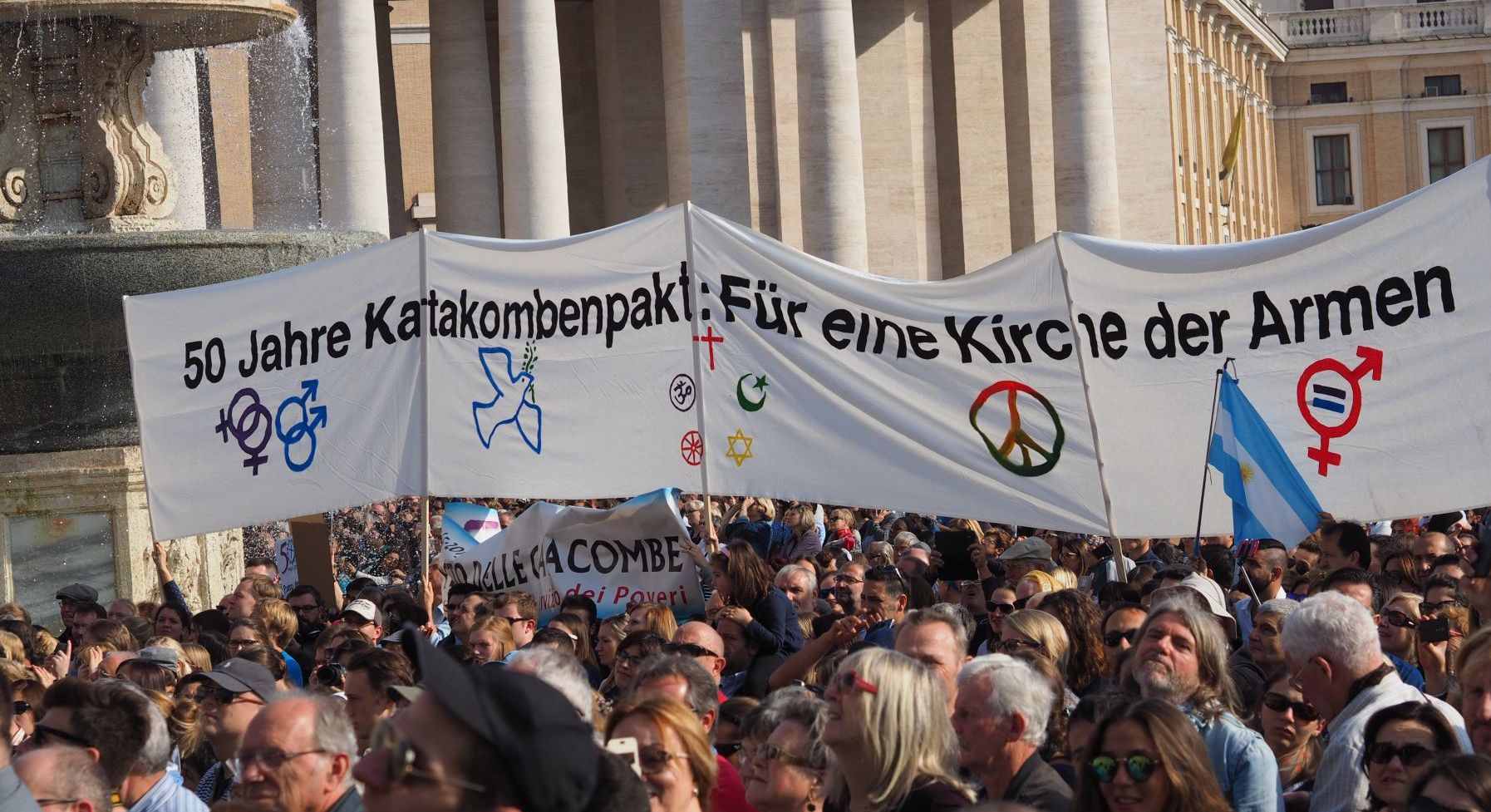The „Catacombs‘ Pact of the Poor and Servant Church“
We, bishops gathered in the Second Vatican Council, made aware of the deficiencies of our lives of poverty according to the Gospel; encouraged by each other; in an initiative in which each one wishes to avoid singularity and presumption; united with all our brothers in the Episcopate; counting above all on the grace and strength of Our Lord Jesus Christ, on the prayers of the faithful and the priests of our respective dioceses; placing ourselves in thought and prayer before the Trinity, before the Church of Christ and before the priests and faithful of our dioceses; humbly conscious of our weakness, but also with all the determination and strength which God wishes to give us as grace, commit ourselves to the following:
1) We will seek to live according to the ordinary manner of our people, regarding habitation, food, means of transport and all which springs from this. Cf. Mt 5,3; 6,33s; 8,20.
2) We definitively renounce the appearance and reality of riches, especially regarding to our manner of dress (rich material, loud colours) and symbols made of precious materials (they should in reality be evangelical signs). Cf. Mc 6,9; Mt 10,9s; At 3,6. Neither gold nor silver.
3) We will not possess real estate, goods, bank accounts etc. in our own names; if it should be necessary to have them, we will place everything in the name of the diocese, or of charitable and social works.. Cf. Mt 6,19-21; Lc 12,33s.
4) Whenever possible, we will entrust the financial and material administration in our dioceses to a commission of competent laity, conscious of their apostolic rôle, so that we may become less administrators and more pastors and apostles.. Cf. Mt 10,8; At. 6,1-7.
5) We refuse to be addressed, orally or in writing, by names or titles which signify prestige and power (Eminence, Excellency, Monsignor…). We prefer to be called by the evangelical title of Father. Cf. Mt 20,25-28; 23,6-11; Jn 13,12-15.
6) In our behaviour and social relations, we will avoid anything which may seem to confer priviledges, priority or any preference for the rich and powerful (such as: banquets, offered or accepted, class distinction during religious services Cf. Lc 13,12-14; 1Cor 9,14-19.)
7) In the same way we will avoid the fostering or pampering of the vanity of anyone, in order to seeking reward or solicit donations, or for any reason whatsoever. We will invite our faithful to consider their donations as a normal participation in the cult, the apostolate and social action. Cf. Mt 6,2-4; Lc 15,9-13; 2Cor 12,4.
eight) We will dedicate whatever is necessary of or time, reflection, heart, means etc to the apostolic and pastoral service of people and groups of workers and of the economically weak and underdeveloped, without prejudice to the other people and groups in the diocese. We will support those laity, religious, deacons and priests who the Lord calls to evangelize the poor and the workers, sharing the work and life of labourers. Cf. Lc 4,18s; Mc 6,4; Mt 11,4s; At 18,3s; 20,33-35; 1Cor 4,12 e 9,1-27.
9) Conscious of the demands of justice and charity, and their mutual relationship, we will seek to transform assistential activites into social works based on justice and charity, which take into account all that this requires, as a humble service of the competent public organs. Cf. Mt 25,31-46; Lc 13,12-14 e 33s.
10) We will do our utmost so that those responsible for our government and for our public services make, and put into practice, laws, structures and social institutions required by justice and charity, equality and the harmonic and holistic development of all men and women, and by this means bring about the advent of another social order, worthy of the sons and daughters of mankind and of God. Cf. At. 2,44s; 4,32-35; 5,4; 2Cor 8 e 9 ; 1Tim 5, 16.
11) Believing the collegiality of the bishops to be of the utmost evangelical importance in facing the burden of human masses, in a state of physical, cultural and moral misery – two thirds of humanity – we commit ourselves:
– to participate, according to our means, in the urgent investments of the episcopates of poor nations;
– to demand that the plans of international organizations, but witnessing to the Gospel, as Pope Paul VI did in the UNO, adopt economic and cultural structures which no longer manufacture proletarian nations in an ever richer world, but which will permit the poor masses to overcome their misery.
12) We commit ourselves to share, in pastoral charity, our lives with our brothers and sisters in Christ, priests, religious and laity, so that our ministry constitute a true service; so,
– we will really try to „revise our lives“ with them;
– We will find collaborators who will be more animators according to the Spirit, rather then according to the chiefs of this world;
-we will seek to be more humanly present, more welcoming…;
– We will show ourselves to be open to all, whatever their religion. Cf. Mc 8,34s; At 6,1-7; 1Tim 3,8-10.
13) On returning to our respective dioceses, we will make this resolution known to our people, asking them to help us by their understanding, collaboration and prayers.
„MAY GOD HELP US TO BE FAITHFUL“.
